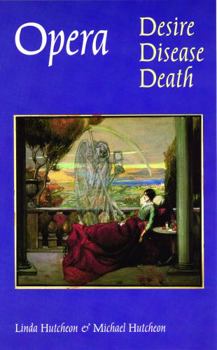Opera: Desire, Disease, Death
Select Format
Select Condition 
Book Overview
"A fascinating interdisciplinary study of the interconnected subtexts of erotic attraction, illness, and death in several 19th- and 20th-century operatic texts. . . . This is an extraordinary examination of how opera uses the singing body--gendered and sexual--to give voice to the suffering person. Highly recommended."--Library Journal "The authors' argument is rich and complex; it draws on source, text and music; it is also medically sound. Opera is quintessentially an art of love and desire, of loss and suffering, of disease and death. Hutcheon and Hutcheon enrich our understanding of both content and context."--Opera News "Linda and Michael Hutcheon have done a fine job of pulling together medical and literary sources to make sense of the changing depiction of disease in opera. . . . For opera lovers and for anyone interested in seeing good, synthetic reasoning at work, this is a fine study."--Publishers Weekly Linda Hutcheon is a professor of English and comparative literature at the University of Toronto. She is the author of, most recently, Irony's Edge: The Theory and Politics of Irony. Michael Hutcheon, M.D., is a professor of medicine at the University of Toronto. His many articles have appeared in American Review of Respiratory Disease and other journals.
Format:Paperback
Language:English
ISBN:0803273185
ISBN13:9780803273184
Release Date:March 1999
Publisher:University of Nebraska Press
Length:296 Pages
Weight:0.90 lbs.
Dimensions:0.7" x 5.5" x 9.0"
Customer Reviews
1 rating
A wealth of dark detail on opera's unique social situations
Published by Thriftbooks.com User , 25 years ago
Opera has become yet another popular sport today,and thank someone that a growing number of essayists and scholars have switched away from the cloistered rigours of musical academia, an academia that simply analyzes how the notes and tones move and come toward organization. This is valuable but explains nothing of the especially fascinating aspects of opera,its historical,social and political dimensions This book indeed has a focus drawing the darker sides of opera's implications. Desire for instance hits us right in the face as in Bizet's "Carmen". There a town in Seville was the site of a tobacco factory employed by only scantily clad women. It was hot in Seville and men(this is a true story) travelled from all over Europe just for a glimpse of the flesh of women rolling these penis-shaped objects. The Hutcheon's bring fascinating detail to their subjects. Michael Hutcheon is a doctor and analyzes the prevalence of consumption and tuberculosis in 19th Century Europe the backdrop of Verdi's "La Traviata". There is story of a consumptive kept woman devoted to the love and desire in all night parties in Paris.But there is a very human side to her as well not simply an avaricious opportunist. Disease was a bourgeois curse at that time that threatened to disrupt the middle-class family values as well as a disruption of profit-making. It was these classes who were in attendance at the opera,so these themes indeed stuck a social resonance. Someone like Violetta Valery, Verdi's anti-heroine, was the focus of this disruption(Violetta after "violare" in Italian to violate). We learn also of the presence of syphillis as an extension of these disruptive disease. The prostitutes in Lille infected the master race during the Second World War, as a means of guerilla warfare, which worked quite well. Speaking about opera in this way drawing all these details from opera's story-lines,plots and aesthetic strategies makes fascinating reading as well as enriching opera's scholarship beyond the four-corners of the music.





